Yakup Ergün, Medical Oncologist at Antalya City Hospital, posted on X:
“What happened in Lung Cancer in 2024?
A summary of important studies.”
Here are all the Important Studies about Lung Cancer in 2024 by Yakup Ergün:
Authors: Ying Cheng, David R Spigel, Byoung Chul Cho, Konstantin K Laktionov, Jian Fang, Yuanbin Chen, Yoshitaka Zenke, Ki Hyeong Lee, Qiming Wang, Alejandro Navarro, Reyes Bernabe, Eva Lotte Buchmeier, John Wen-Cheng Chang, Yoshimasa Shiraishi, Sema Sezgin Goksu, Andrzej Badzio, Anhui Shi, Davey B Daniel, Nguyen Thi Thai Hoa, Milada Zemanova, Helen Mann, Hema Gowda, Haiyi Jiang, Suresh Senan; ADRIATIC Investigators
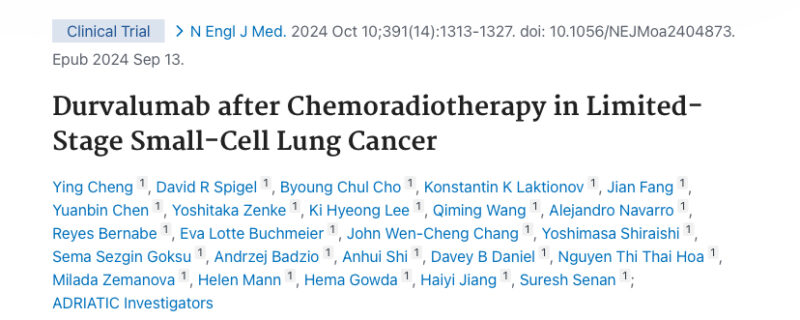
In a phase 3 randomized, placebo-controlled trial, adjuvant durvalumab significantly improved OS and PFS in patients with limited-stage SCLC who had no disease progression after concurrent platinum-based chemoradiotherapy.
Median OS was longer with durvalumab (55.9 months) compared to placebo (33.4 months) (HR 0.73). PFS was also improved (16.6 vs. 9.2 months) (HR 0.76). Grade 3-4 adverse events were similar between groups. Durvalumab received FDA approval for this indication on December 4, 2024.
Authors: Alison M. Schram, Koichi Goto, Dong-Wan Kim, Patricia Martin-Romano, Sai-Hong Ignatius Ou, Grainne M. O’Kane, Eileen Mary O’Reilly, Kumiko Umemoto, Michaël Duruisseaux, Cindy Neuzillet, Frans Opdam, Jordi Rodon Ahnert, Misako Nagasaka, Benjamin Adam Weinberg, TeresaMacarulla, Andrew K. Joe, Jim Ford, Viktoriya Stalbovskaya, Ernesto Wasserman, and Alexander E. Drilon
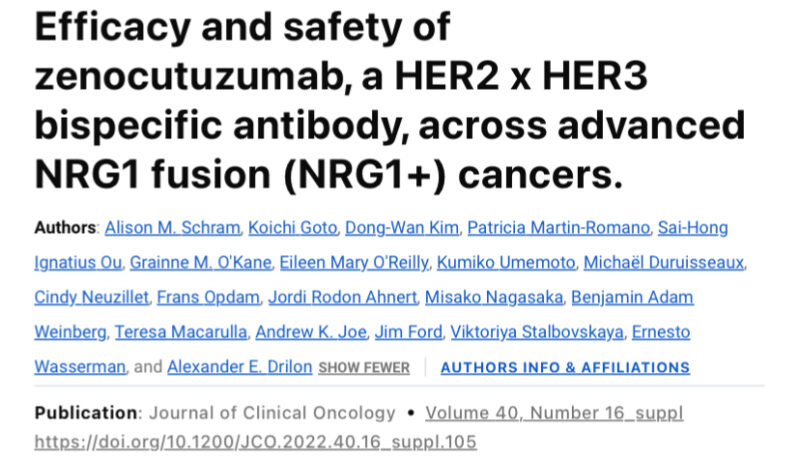
On December 4, 2024, the FDA granted accelerated approval to zenocutuzumab-zbco for adults with advanced, unresectable, or metastatic NSCLC harboring a neuregulin 1 (NRG1) gene fusion, with disease progression on or after prior systemic therapy. In the NSCLC cohort, the confirmed ORR was 33%, meaning one-third of the patients responded to the treatment.
The median DOR was 7.4 months, indicating that responses lasted for a median of over seven months. This represents a significant milestone, as it is the first FDA approval of a systemic therapy specifically targeting NSCLC patients with NRG1 gene fusion.
Authors: Xiuning Le, Jyoti D Patel, Elaine Shum, Christina Baik, Rachel E Sanborn, Catherine A Shu, Chul Kim, Mary Jo Fidler, Richard Hall, Yasir Y Elamin, Janet Tu, George Blumenschein, Jianjun Zhang, Don Gibbons, Carl Gay, Nisha A Mohindra, Young Chae, Yanis Boumber, Joshua Sabari, Rafael Santana-Davila, Shane Rogosin, Benjamin Herzberg, Ben Creelan, Bruna Pellini, Tawee Tanvetyanon, Simon Heeke, Mike Hernandez, Jhanelle E Gray, Andreas Saltos, John V Heymach
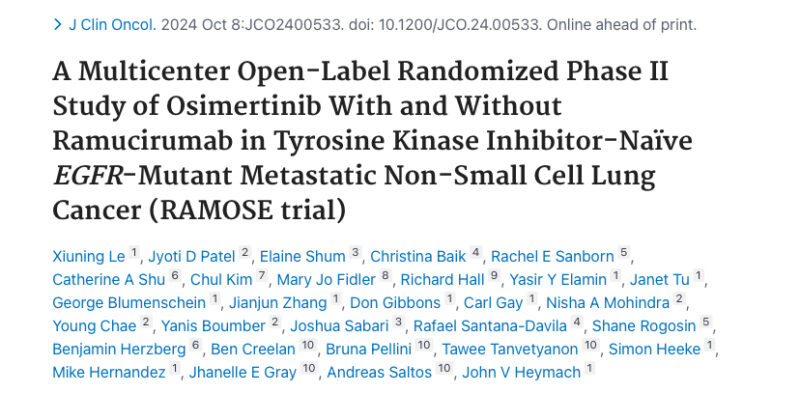
A phase II study demonstrated that combining ramucirumab with osimertinib significantly improved PFS in patients with EGFR-mutant NSCLC compared to osimertinib alone (24.8 vs. 15.6 months, HR 0.55). The 12-month PFS rates were 76.7% and 61.9%, respectively. Treatment-related adverse events occurred in all patients, with grade 3 adverse events seen in 53% and 41% of patients, respectively.
CheckMate 77T Trial: Perioperative Nivolumab in Resectable Lung Cancer | NEJM
Authors: Tina Cascone, Mark M. Awad, Jonathan D. Spicer, Jie He, Shun Lu, Boris Sepesi, Fumihiro Tanaka, Janis M. Taube, Robin Cornelissen, Libor Havel, Nina Karaseva, Jaroslaw Kuzdzal, Lubos B. Petruzelka, LinWu, Jean-Louis Pujol, Hiroyuki Ito, Tudor-Eliade Ciuleanu, Ludmila de Oliveira Muniz Koch, Annelies Janssens, Aurelia Alexandru, Sabine Bohnet, Fedor V. Moiseyenko, Yang Gao, Yasutaka Watanabe, Cinthya Coronado Erdmann, Padma Sathyanarayana, Stephanie Meadows-Shropshire, Steven I. Blum, Mariano Provencio Pulla, for the CheckMate 77T Investigators
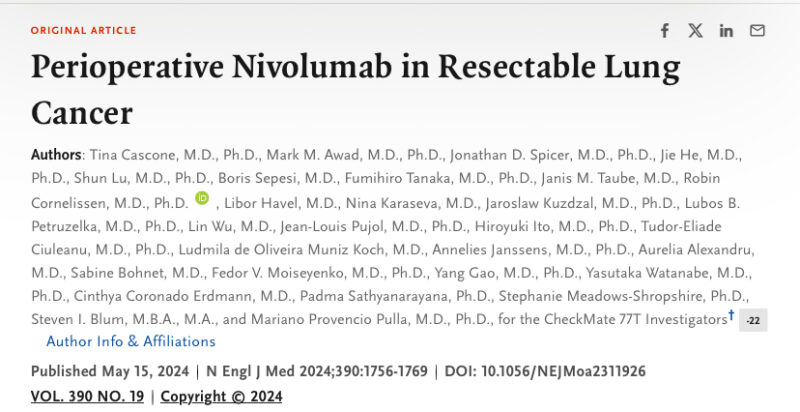
Perioperative treatment with nivolumab plus chemotherapy resulted in significantly longer EFS compared to chemotherapy in patients with resectable NSCLC.
In the prespecified interim analysis with a median follow-up of 25.4 months, the 18- month EFS rate was 70.2% in the nivolumab group and 50.0% in the chemotherapy group (HR 0.58). The PCR rate was 25.3% in the nivolumab group and 4.7% in the chemotherapy group. This treatment was approved by the FDA on October 3, 2024.
LAURA trial: Osimertinib after Chemoradiotherapy in Stage III EGFR-Mutated NSCLC | ASCO24 and NEJM
Authors: Shun Lu, Terufumi Kato, Xiaorong Dong, Myung-Ju Ahn, Le-Van Quang, Nopadol Soparattanapaisarn, Takako Inoue, Chih-Liang Wang, Meijuan Huang, James Chih-Hsin Yang, Manuel Cobo, Mustafa Özgüroğlu, Ignacio Casarini, Dang-Van Khiem, Virote Sriuranpong, Eduardo Cronemberger, Toshiaki Takahashi, Yotsawaj Runglodvatana, Ming Chen, Xiangning Huang, Ellie Grainger, Dana Ghiorghiu, Toon van der Gronde, Suresh S.Ramalingam, for the LAURA Trial Investigators
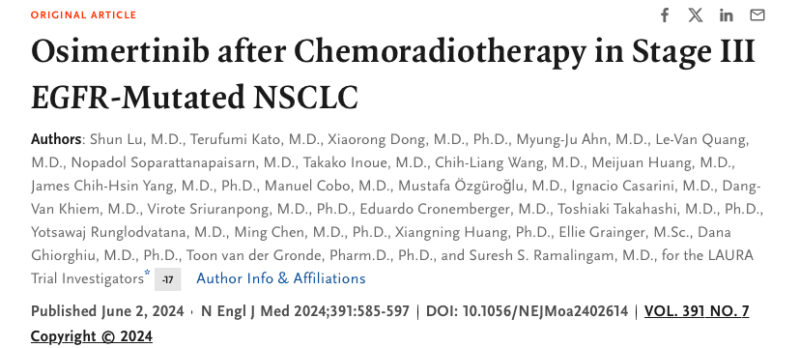
Osimertinib significantly improved PFS compared to placebo in patients with unresectable stage III EGFR-mutated NSCLC who did not show progression during or after chemoradiotherapy. In a phase 3 trial, patients treated with osimertinib had a median PFS of 39.1 months, compared to 5.6 months in the placebo group (HR 0.16). Interim OS data showed 36-month survival rates of 84% for osimertinib and 74% for placebo.
Osimertinib was granted FDA approval for this indication on September 25, 2024. After the initial results, one of the critiques raised was regarding the PET/CT staging rate. This was subsequently addressed, and it was revealed that around 50% of patients in both groups had PET/CT staging. According to the ESMO24 results, osimertinib was found to be similarly more effective in both groups.
Authors: A. Passaro, J. Wang, Y. Wang, S.-H. Lee, B. Melosky, J.-Y. Shih, J. Wang, K. Azuma, O. Juan-Vidal, M. Cobo, E. Felip, N. Girard, A.B. Cortot, R. Califano, F. Cappuzzo, S. Owen, S. Popat, J.-L. Tan, J. Salinas, P. Tomasini, R.D. Gentzler, W.N. William, Jr., K.L. Reckamp, T. Takahashi, S. Ganguly, D.M. Kowalski, A. Bearz, M. MacKean, P. Barala, A.B. Bourla, A. Girvin, J. Greger, D. Millington, M. Withelder, J. Xie, T. Sun, S. Shah, B. Diorio, R.E. Knoblauch, J.M. Bauml, R.G. Campelo, B.C. Cho, for the MARIPOSA-2 Investigators
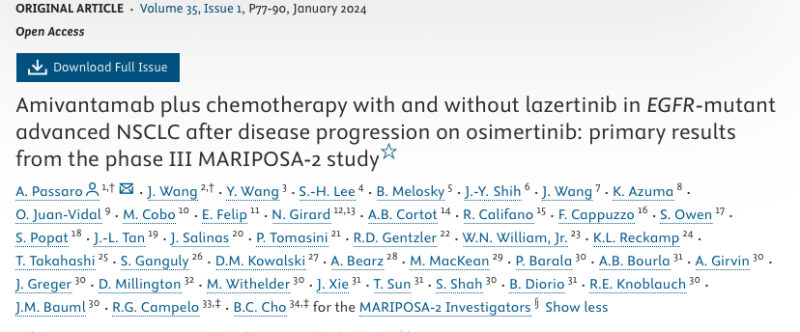
On September 19, 2024, the FDA approved amivantamab in combination with carboplatin and pemetrexed for the treatment of adult patients with locally advanced or metastatic NSCLC with EGFR exon 19 deletions or exon 21 L858R mutations whose disease has progressed on or after treatment with an EGFR TKI.
In the phase III trial, median PFS was significantly longer for amivantamab + carboplatin-pemetrexed (6.3 months) compared to carboplatin-pemetrexed alone (4.2 months) (HR:0.48). The confirmed ORR was 53% for amivantamab + carboplatin-pemetrexed and 29% for carboplatin- pemetrexed. No significant difference in OS was observed at the second interim analysis.
Authors: G. Goss, G.E. Darling, V. Westeel, K. Nakagawa, B. Massuti Sureda, F. Perrone, S-A. McLachlan, J.H. Kang, Y-L. Wu, A-M.C. Dingemans, R. Dziadziuszko, M. Okada, L. Greillier, C. Audigier-Valette, S. Sugawara, E. Nadal, A. Catino, M.R. Stockler, K. Ding, C. O’Callaghan
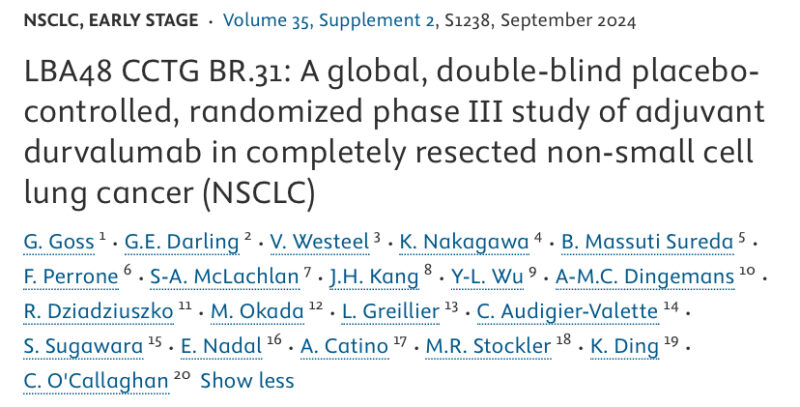
The BR.31 trial evaluated adjuvant durvalumab in early-stage resected NSCLC with PD-L1 expression. After randomizing 1,415 patients to durvalumab or placebo, the trial found no significant improvement in DFS for durvalumab compared to placebo in EGFR-/ALK- patients, regardless of PD-L1 status. The median DFS for durvalumab was 70 months versus 60 months for placebo in PD-L1 TC ≥25% patients, and 60 months for both groups in PD-L1 TC ≥1%.
Authors: C. Zhou, J. Chen, L. Wu, L. Wang, A. Xiong, B. Liu, J. Yao, H. Zhong, J. Li, Y. Cheng, Y. Sun, H. Ge, Q. Shi, M. Zhou, Z. Han, J. Wang, Q. Bu, Y. Zhao, J. Chen, J. Yang, M. Xi
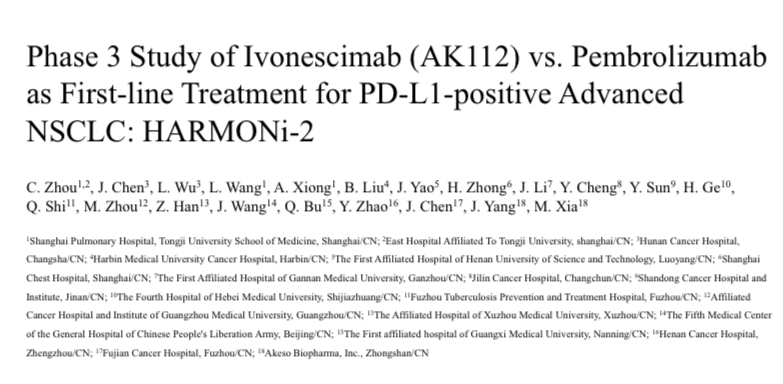
In a phase 3 trial conducted exclusively in Chinese patients, ivonescimab, a PD-1/VEGF bispecific antibody, demonstrated superior efficacy compared to pembrolizumab in advanced NSCLC with a PD-L1 TPS of 1% or greater.
However, the study has faced criticism because, in the 1% to 49% PD-L1 range, the SoC is not pembrolizumab monotherapy, but a combination of chemotherapy and pembrolizumab. Ivonescimab showed an improvement in PFS compared to pembrolizumab (11.14 vs 5.82 months, HR: 0.51). The ORR was 50.0% with ivonescimab versus 38.5% with pembrolizumab.
Authors: HARMONi-A Study Investigators; Wenfeng Fang, Yuanyuan Zhao, Yongzhong Luo, Runxiang Yang, Yan Huang, Zhiyong He, Hui Zhao, Mingjun Li, Kai Li, Qibing Song, Xiaobo Du, Yulan Sun, Wei Li, Fei Xu, Zhiyu Wang, Kunning Yang, Yun Fan, Baogang Liu, Hongyun Zhao, Ying Hu, Li Jia, Shen Xu, Tienan Yi, Dongqing Lv, Haitao Lan, Mengxia Li, Wenhua Liang, Yongsheng Wang, Hui Yang, Yuming Jia, Yuan Chen, Junguo Lu, Jifeng Feng, Chunling Liu, Ming Zhou, Jianya Zhou, Xianling Liu, Ningning Zhou, Ming He, Xiaorong Dong, Hualin Chen, Yongxing Chen, Haichuan Su, Xiaoling Li, Zhihong Zhang, Lei Yang, Ying Cheng, Likun Chen, Xue Hou, Yu Zhang, Jun Guo, Zhen Wang, Hong Lu, Di Wu, Weineng Feng, Wen Li, Jianan Huang, Yan Wang, Xia Song, Jiewen Peng, Laiyu Liu, Yubiao Guo, Wenting Li, Dongmei Lu, Mingxiu Hu, Zhongmin Maxwell Wang, Baiyong Li, Michelle Xia, Li Zhang.
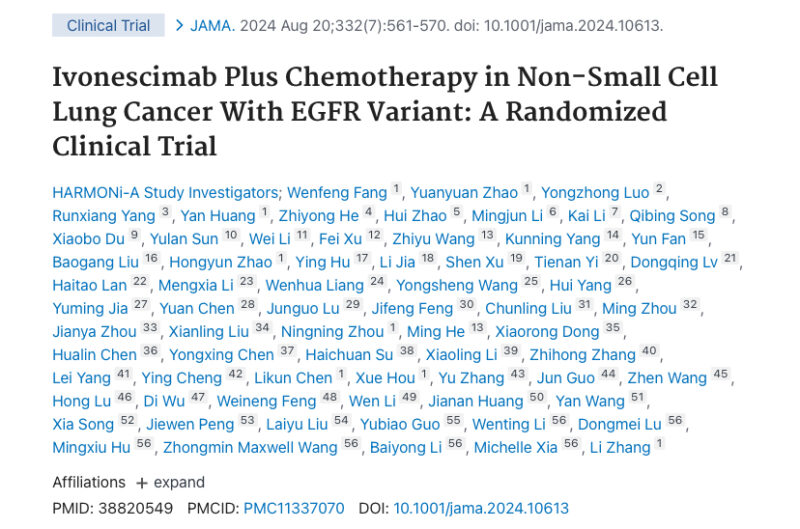
The phase 3 trial compared ivonescimab plus chemotherapy to chemotherapy alone in patients with advanced or metastatic EGFR-mutant NSCLC who had progressed on EGFR-TKI therapy.. The ivonescimab group showed a median PFS of 7.1 months compared to 4.8 months in the placebo group (HR, 0.46). The ORR was 50.6% vs 35.4%. Grade 3 or higher adverse events were more common with ivonescimab (61.5% vs 49.1%). The trial demonstrated a significant PFS benefit with ivonescimab.
Authors: Myung-Ju Ahn, Kentaro Tanaka, Luis Paz-Ares, Robin Cornelissen, Nicolas Girard, Elvire Pons-Tostivint, David Vicente Baz, Shunichi Sugawara, Manuel Cobo, Maurice Pérol, Céline Mascaux, Elena Poddubskaya, Satoru Kitazono, Hidetoshi Hayashi, Min Hee Hong, Enriqueta Felip, Richard Hall, Oscar Juan-Vidal, Daniel Brungs, Shun Lu, Marina Garassino, Michael Chargualaf, Yong Zhang, Paul Howarth, Deise Uema, Aaron Lisberg, Jacob Sands; TROPION-Lung01 Trial Investigators.
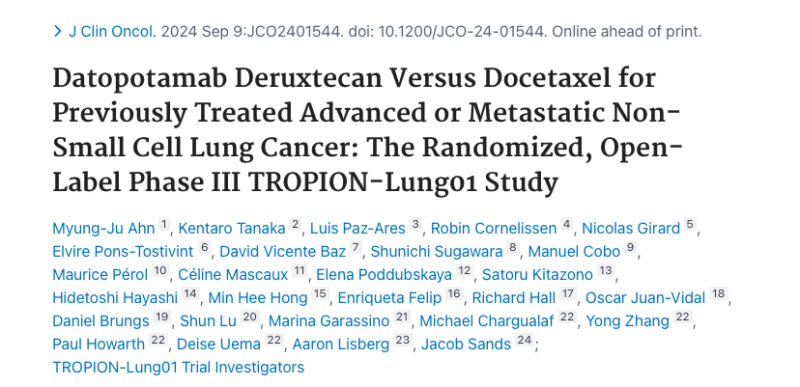
Dato-DXd significantly improved PFS compared to docetaxel in patients with advanced/metastatic NSCLC, particularly in those with nonsquamous histology. Although the OS showed a numerical benefit, it did not reach statistical significance.
A prospective trial with sufficient statistical power to detect a clinically relevant difference in OS in patients with nonsquamous NSCLC is warranted to further evaluate Dato-DXd’s potential benefit in this subgroup.
Authors: Mariano Provencio, Ernest Nadal, Amelia Insad, Rosario García Campelo, Joaquín Casal, Manuel Dómine, Bartomeu Massuti, Margarita Majem, Delvys Rodríguez-Abreu, Alex Martínez-Martí, Javier de Castro, David Gómez de Antonio, Iván Macia, Santiago Figueroa, Luís Fernández Vago, Virginia Calvo, Ramón Palmero, Belén Sierra-Rodero, Cristina Martínez-Toledo, Marta Molina-Alejandre, Roberto Serna-Blasco, Atocha Romero, Alberto Cruz-Bermúdez.
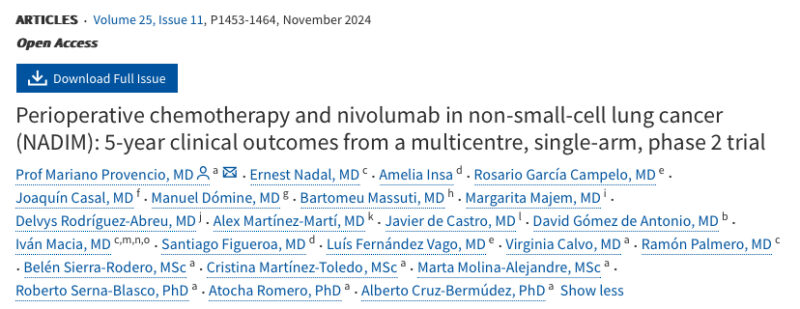
In the NADIM trial, perioperative chemoimmunotherapy with nivolumab showed promising long-term benefits for patients with resectable stage IIIA NSCLC. After 5 years, PFS was 65%, and overall survival was 69.3%.
Disease progression occurred in 24% of patients, and 30% died, with 20% of deaths attributed to disease relapse. Treatment-related adverse events (grade 3 or worse) occurred in 30% during neoadjuvant therapy and 19% during adjuvant therapy.
Authors: Mariano Provencio, Ernest Nadal, Amelia Insad, Rosario García Campelo, Joaquín Casal, Manuel Dómine, Bartomeu Massuti, Margarita Majem, Delvys Rodríguez-Abreu, Alex Martínez-Martí, Javier de Castro, David Gómez de Antonio, Iván Macia, Santiago Figueroa, Luís Fernández Vago, Virginia Calvo, Ramón Palmero, Belén Sierra-Rodero, Cristina Martínez-Toledo, Marta Molina-Alejandre, Roberto Serna-Blasco, Atocha Romero, Alberto Cruz-Bermúdez
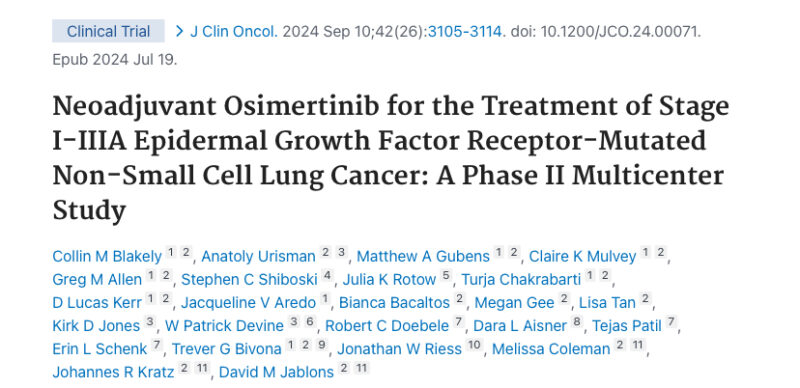
Treatment with neoadjuvant osimertinib resulted in an MPR rate of approximately 15%, which did not meet the primary end point of the study.
Neoadjuvant osimertinib did not result in unexpected delays in surgery or significant toxicity in the perioperative setting. The unresectability rate after neoadjuvant osimertinib was 11%. The pathological response data indicate single agent osimertinib has insufficient activity as preoperative therapy. Trials of combination therapy are ongoing.
Authors: Filippo de Marinis, Eiji Iwama, Takako Inoue, Jerónimo Rodríguez-Cid, Li Zhang, Cheng-Ta Yang, Emmanuel de la Mora Jimenez, Jianying Zhou, Maurice Pérol, Ki Hyeong Lee, David Vicente, Eiki Ichihara, Gregory J Riely, Yiwen Luo, Diana Chirovsky, M Catherine Pietanza, Niyati Bhagwati, Shun Lu
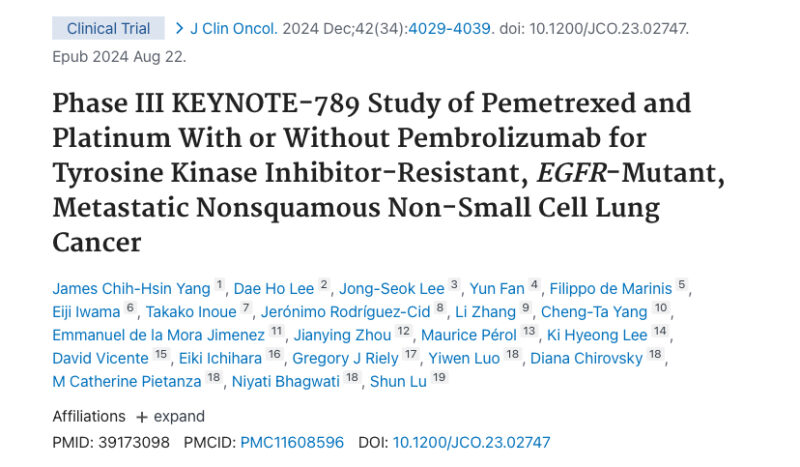
The phase III trial evaluated pembrolizumab plus chemotherapy versus placebo plus chemotherapy in patients with EGFR- mutant, metastatic NSCLC who had progressed after EGFR-TKI therapy. The median PFS was 5.6 months versus 5.5 months, and the median OS was 15.9 months versus 14.7 months, showing no significant improvement with pembrolizumab. Grade 3 or higher adverse events occurred in 43.7% of the pembrolizumab group compared to 38.6% in the placebo group. The study did not demonstrate significant benefit in PFS or OS.
Authors: Shun Lu, Wei Zhang, Lin Wu, Wenxiang Wang, Peng Zhang, and the Neotorch Investigators
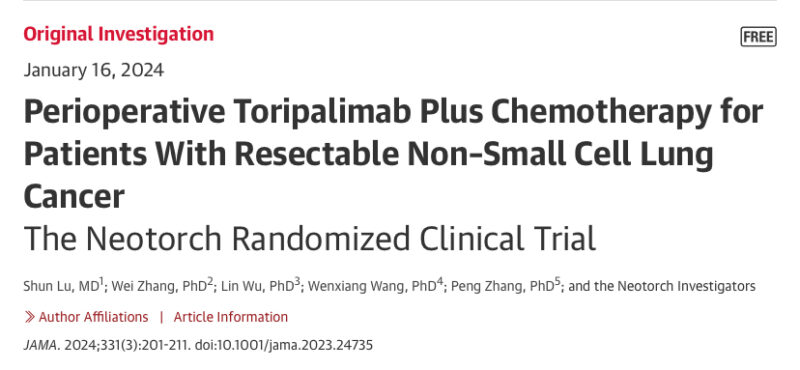
The addition of toripalimab to perioperative chemotherapy significantly improved EFS and pathological responses in patients with resectable stage III NSCLC. The median EFS was not reached in the toripalimab group compared to 15.1 months in the placebo group (HR, 0.40). MPR was 48.5% with toripalimab versus 8.4% with placebo, while pCR was 24.8% versus 1.0%, respectively.
Authors: Byoung C. Cho, Shun Lu, Enriqueta Felip, Alexander I. Spira, Nicolas Girard, Jong-Seok Lee, Se-Hoon Lee, Yurii Ostapenko, Pongwut Danchaivijitr, Baogang Liu, Adlinda Alip, Ernesto Korbenfeld, Josiane Mourão Dias, Benjamin Besse, Ki-Hyeong Lee, Hailin Xiong, Soon-Hin How, Ying Cheng, Gee-Chen Chang, Hiroshige Yoshioka, James C.-H. Yang, Michael Thomas, Danny Nguyen, Sai-Hong I. Ou, Sanjay Mukhedkar, Kumar Prabhash, Manolo D’Arcangelo, Jorge Alatorre-Alexander, Juan C. Vázquez Limón, Sara Alves, Daniil Stroyakovskiy, Marina Peregudova, Mehmet A.N. Şendur, Ozan Yazici, Raffaele Califano, Vanesa Gutiérrez Calderón, Filippo de Marinis, Antonio Passaro, Sang-We Kim, Shirish M. Gadgeel, John Xie, Tao Sun, Melissa Martinez, Mariah Ennis, Elizabeth Fennema, Mahesh Daksh, Dawn Millington, Isabelle Leconte, Ryota Iwasawa, Patricia Lorenzini, Mahadi Baig, Sujay Shah, Joshua M. Bauml, S. Martin Shreeve, Seema Sethi, Roland E. Knoblauch, and Hidetoshi Hayashi, for the MARIPOSA Investigators.
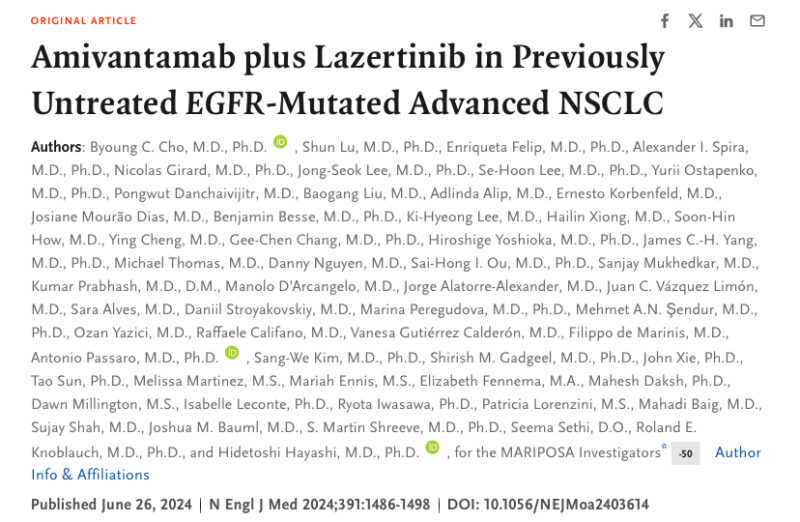
In a randomized phase 3 trial, amivantamab-lazertinib demonstrated superior efficacy compared to osimertinib in patients with previously untreated EGFR-mutated advanced NSCLC. The median PFS was 23.7 months with amivantamab-lazertinib versus 16.6 months with osimertinib (HR 0.70).
The ORR was similar between the two groups (86% vs. 85%), but the median duration of response was longer with amivantamab-lazertinib (25.8 vs. 16.8 months). A planned interim analysis showed a trend toward improved OS with amivantamab-lazertinib.
The primary adverse events were EGFR-related toxicities, with a higher rate of treatment discontinuation in the amivantamab-lazertinib group (10% vs. 3%). Amivantamab-lazertinib was approved by the FDA on August 20, 2024.
Authors: Natasha B Leighl, Hiroaki Akamatsu, Sun Min Lim, Ying Cheng, Anna R Minchom, Melina E Marmarelis, Rachel E Sanborn, James Chih-Hsin Yang, Baogang Liu, Thomas John, Bartomeu Massutí, Alexander I Spira, Se-Hoon Lee, Jialei Wang, Juan Li, Caigang Liu, Silvia Novello, Masashi Kondo, Motohiro Tamiya, Ernesto Korbenfeld, Mor Moskovitz, Ji-Youn Han, Mariam Alexander, Rohit Joshi, Enriqueta Felip, Pei Jye Voon, Pongwut Danchaivijitr, Ping-Chih Hsu, Felipe José Silva Melo Cruz, Thomas Wehler, Laurent Greillier, Encarnação Teixeira, Danny Nguyen, Joshua K Sabari, Angel Qin, Dariusz Kowalski, Mehmet Ali Nahit Şendur, John Xie, Debopriya Ghosh, Ali Alhadab, Nahor Haddish-Berhane, Pamela L Clemens, Patricia Lorenzini, Remy B Verheijen, Mohamed Gamil, Joshua M Bauml, Mahadi Baig, Antonio Passaro; PALOMA-3 Investigators.
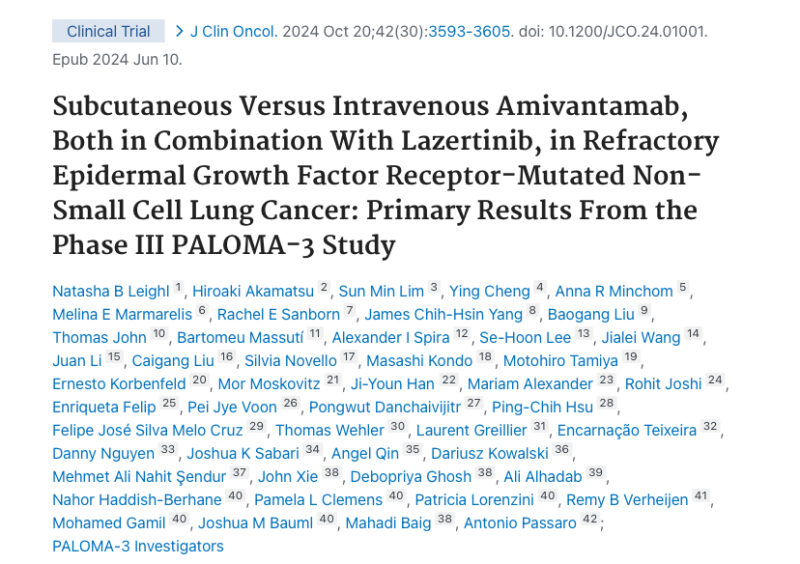
Subcutaneous amivantamab-lazertinib demonstrated noninferior pharmacokinetics and ORR, with potentially longer response duration, PFS, and OS compared with intravenous amivantamab-lazertinib. The subcutaneous formulation also exhibited reduced infusion-related reactions and venous thromboembolic events, with shorter treatment administration times and enhanced patient convenience compared with the intravenous formulation.
Authors: : Si-Yu Wang, Hao Long, Ning Li, Chao Cheng, Wei Ou, Lin Yang, Jian You, Yi Liang, Bao-Xiao Wang
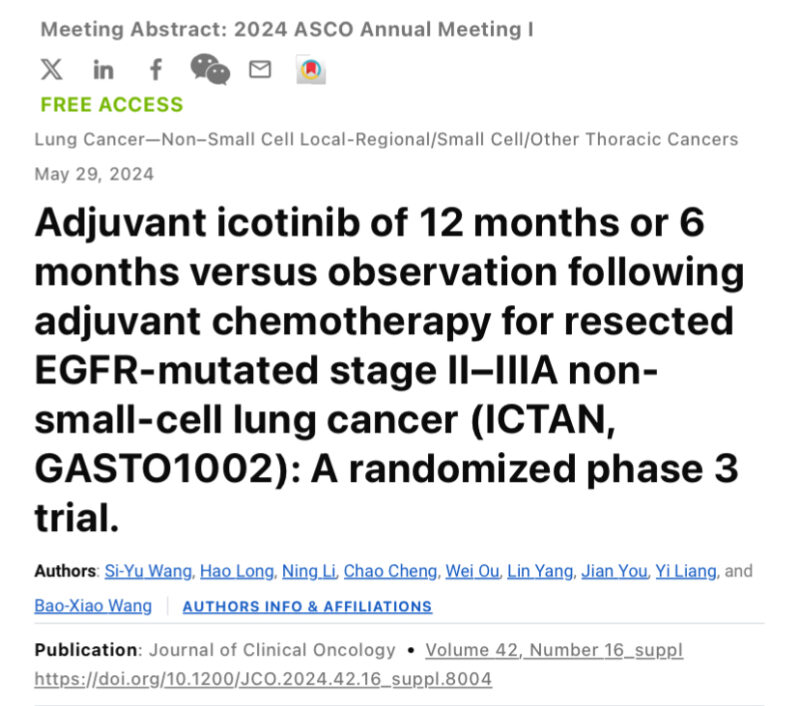
This phase 3 trial evaluated the efficacy and safety of adjuvant icotinib in patients with completely resected EGFR-mutated stage II-IIIA NSCLC after platinum-based chemotherapy. Patients were randomly assigned to receive icotinib for 12 months, 6 months, or observation.
Both 6 months and 12 months of icotinib significantly improved DFS and OS compared to observation. However, no additional benefit was observed with 12 months of treatment over 6 months. The safety profile was manageable, with fewer adverse events in the 6-month group.
Authors: Geoffrey Liu, Enriqueta Felip, Tony S K Mok, Ross A Soo, Julien Mazieres, Alice T Shaw, Filippo de Marinis, Yasushi Goto, Yi-Long Wu, Dong-Wan Kim, Jean-François Martini, Rossella Messina, Jolanda Paolini, Anna Polli, Despina Thomaidou, Francesca Toffalorio, Todd M Bauer
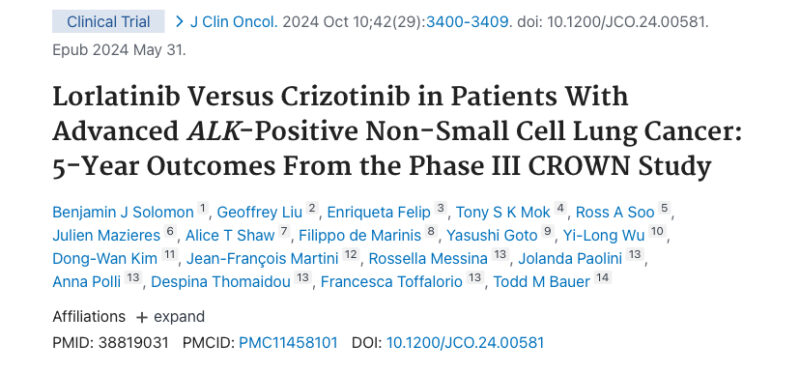
Lorlatinib significantly improved PFS and intracranial efficacy compared to crizotinib in patients with untreated, advanced ALK-positive NSCLC. After 5 years of follow-up, lorlatinib showed a 60% 5-year PFS rate, with no new resistance mutations detected. These remarkable results establish lorlatinib as a new benchmark for targeted therapies in advanced ALK-positive NSCLC.
Authors: Luis G Paz-Ares, Oscar Juan-Vidal, Giannis S Mountzios, Enriqueta Felip, Niels Reinmuth, Filippo de Marinis, Nicolas Girard, Vipul M Patel, Takayuki Takahama, Scott P Owen, Douglas M Reznick, Firas B Badin, Irfan Cicin, Sabeen Mekan, Riddhi Patel, Eric Zhang, Divyadeep Karumanchi, Marina Chiara Garassino
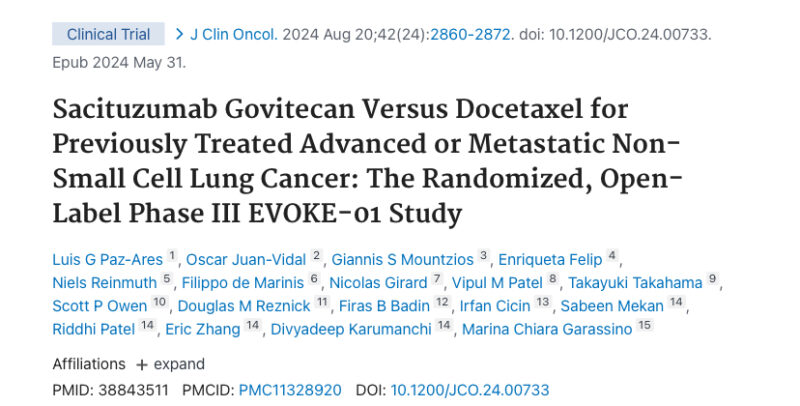
SG demonstrated a numerical OS benefit over docetaxel (median, 11.1 vs 9.8 months; HR: 0.84; P = .0534), with this effect consistent across histologies and clinically meaningful in patients who were nonresponsive to the last anti-PD-(L)1- containing regimen.
SG also showed fewer grade 23 adverse events and treatment-related discontinuations compared to docetaxel. Although SG did not achieve statistical significance for OS improvement, the results may have implications for other antibody-drug conjugates currently in development.
Authors: Sehhoon Park, Tae Min Kim, Ji-Youn Han, Gyeong-Won Lee, Byoung Yong Shim, Yun-Gyoo Lee, Sang-We Kim, Il Hwan Kim, Suee Lee, Yu Jung Kim, Ji Hyun Park, Sang-Gon Park, Ki Hyeong Lee, Eun Joo Kang, Ju Won Kim, Seong-Hoon Shin, Chan-Young Ock, Byung-Ho Nam, Jaebong Lee, Hyun-Ae Jung, Jong-Mu Sun, Se-Hoon Lee, Jin Seok Ahn, Myung-Ju Ahn.
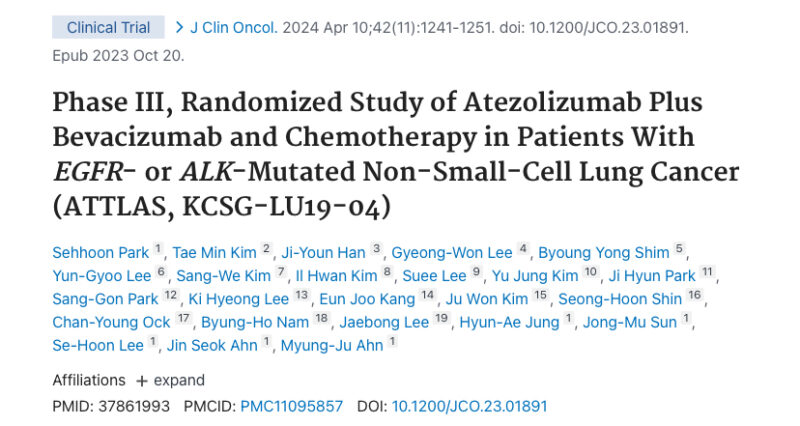
In this randomized phase III study, the addition of atezolizumab, bevacizumab, paclitaxel, and carboplatin (ABCP) demonstrated significantly improved progression-free survival (PFS) and objective response rates in patients with EGFR- or ALK-mutated NSCLC who had progressed after tyrosine kinase inhibitor (TKI) therapy.
The ABCP arm showed a median PFS of 8.48 months compared to 5.62 months in the pemetrexed plus carboplatin/cisplatin (PC) arm (HR, 0.62; P = .004), with greater PFS benefit seen as PD-L1 expression increased. However, overall survival was similar between the ABCP and PC arms (20.63 vs 20.27 months).
ALINA Trial: Alectinib in Resected ALK-Positive Non-Small-Cell Lung Cancer | NEJM
Authors: Yi-Long Wu, Rafal Dziadziuszko, Jin Seok Ahn, Fabrice Barlesi, Makoto Nishio, Dae Ho Lee, Jong-Seok Lee, Wenzhao Zhong, Hidehito Horinouchi, Weimin Mao, Maximilian Hochmair, Filippo de Marinis, M. Rita Migliorino, Igor Bondarenko, Shun Lu, Qun Wang, Tania Ochi Lohmann, Tingting Xu, Andres Cardona, Thorsten Ruf, Johannes Noe, Benjamin J. Solomon, for the ALINA Investigators
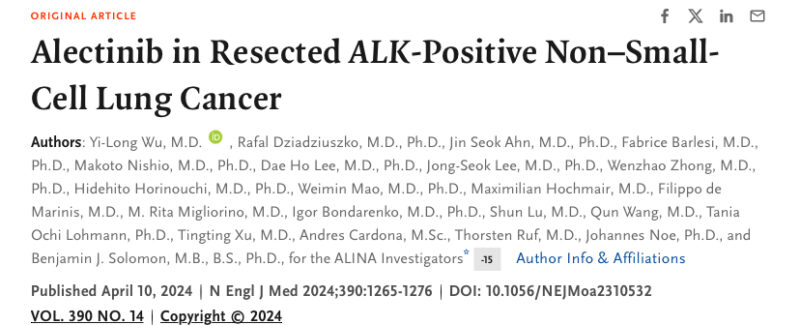
Adjuvant alectinib significantly improved disease-free survival compared to platinum-based chemotherapy in patients with resected ALK-positive non-small-cell lung cancer (NSCLC) of stage IB, II, or IIIA.
After 2 years, 93.8% of patients in the alectinib group were alive and disease-free, compared to 63.0% in the chemotherapy group (HR:024). Alectinib also showed a clinically meaningful benefit in central nervous system DFS (HR: 0.22). Overall survival data were immature. On April 18, 2024, the FDA approved adjuvant alectinib.
Further Reading:
A summary of important studies in breast cancer from 2024 by Yakup Ergün


